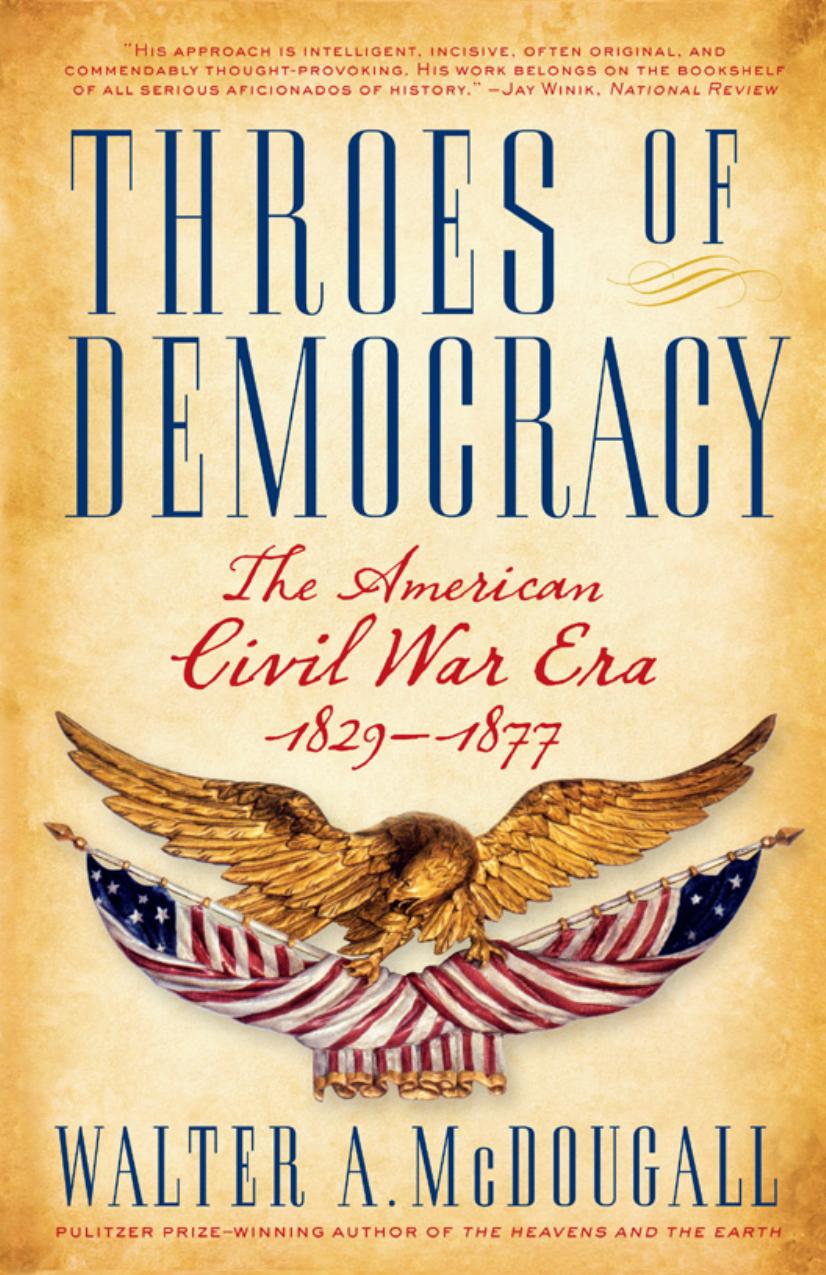Throes of Democracy by Walter A. McDougall

Author:Walter A. McDougall
Language: eng
Format: epub, pdf
Publisher: HarperCollins
The man Lincoln appointed after Bull Run to whip 175,000 recruits into the proud army of the Potomac and suppress the rebellion was short, dashing, and brash. People called him “little Mac” and “the young Napoleon.” He seemed forever in motion attending to organization, logistics, and drill. Around the District of Columbia he designed an elaborate ring of fortifications and staged endless reviews, saluting his soldiers from horseback and making them feel like winners. Journalists, generals, congressmen, and even the president doted on him. All this was enough to cause Scott to resign in disgust (pleading ill health). When Lincoln turned over command of the Union forces to a man less than half Scott’s age, the martinet boasted, “I can do it all,” His pride and petulance were on display in the indiscreet letters he sent to his wife. At first the letters boasted of his prestige and the great work God had given him. Later they whined about plots and called the members of Lincoln’s cabinet so many geese, puppies, old women, idiots, and traitors. Prickly personalities and some genuine issues got his goat, but the main cause of discord was his own lethargy. As late as December, when the Thirty-Seventh Congress finally convened, the general still had no timetable for an offensive. Lincoln called it a bad case of “the slows.” Benjamin Wade, chairman of the Joint Committee on the Conduct of the War, suspected it was a sign of disloyalty.42 Finally, after the Army of the Potomac took the field, “little Mac” squandered a good chance to take Richmond by storm and blamed everyone else when he didn’t.
That much everyone knows about George Brinton McClellan, a “vain and unstable” man “possessed by demons and delusions” or even a “messianic complex.” Yet no less an authority than Ulysses Grant confessed, “McClellan is to me one of the mysteries of the war.” The mystery is worth plumbing because its clues reveal much about northerners’ opinion in the months before the rebellion became a “great civil war.” In his annual message on December 3, 1861 (McClellan’s thirty-fifth birthday), Lincoln angered Radical Republicans when he insisted that the general in chief was “in considerable degree, the selection of the Country as well as of the Executive.” Lincoln soon regretted the selection, but his statement was true.43
McClellan, the middle of three sons of a doctor, grew up in a town house in Philadelphia across the street from the First United States Bank. His family was fervently Whig. George learned to restrain passion through self-discipline, value education and science, and espouse a respectable low-church Episcopalianism. After graduating second in the class of 1846 at West Point, he ably served Scott in the Mexican War. But the growing influence of passionate Free-Soilers caused the whole McClellan clan to defect to the Douglas Democrats in 1852. In their view, the Whig Party of Clay and Webster had ceased to exist. In 1857 George resigned his commission to manage two railroads: the Illinois Central (where he scheduled trains for the Lincoln-Douglas debates), and the Ohio and Mississippi.
Download
This site does not store any files on its server. We only index and link to content provided by other sites. Please contact the content providers to delete copyright contents if any and email us, we'll remove relevant links or contents immediately.
| Anthropology | Archaeology |
| Philosophy | Politics & Government |
| Social Sciences | Sociology |
| Women's Studies |
The Secret History by Donna Tartt(16623)
The Social Justice Warrior Handbook by Lisa De Pasquale(11489)
Thirteen Reasons Why by Jay Asher(7788)
This Is How You Lose Her by Junot Diaz(5772)
Weapons of Math Destruction by Cathy O'Neil(5037)
Zero to One by Peter Thiel(4824)
The Myth of the Strong Leader by Archie Brown(4789)
Promise Me, Dad by Joe Biden(4447)
Beartown by Fredrik Backman(4419)
Stone's Rules by Roger Stone(4415)
How Democracies Die by Steven Levitsky & Daniel Ziblatt(4399)
The Fire Next Time by James Baldwin(4343)
100 Deadly Skills by Clint Emerson(4079)
A Higher Loyalty: Truth, Lies, and Leadership by James Comey(4033)
Rise and Kill First by Ronen Bergman(4012)
The David Icke Guide to the Global Conspiracy (and how to end it) by David Icke(3882)
The Farm by Tom Rob Smith(3872)
Secrecy World by Jake Bernstein(3782)
The Doomsday Machine by Daniel Ellsberg(3731)
